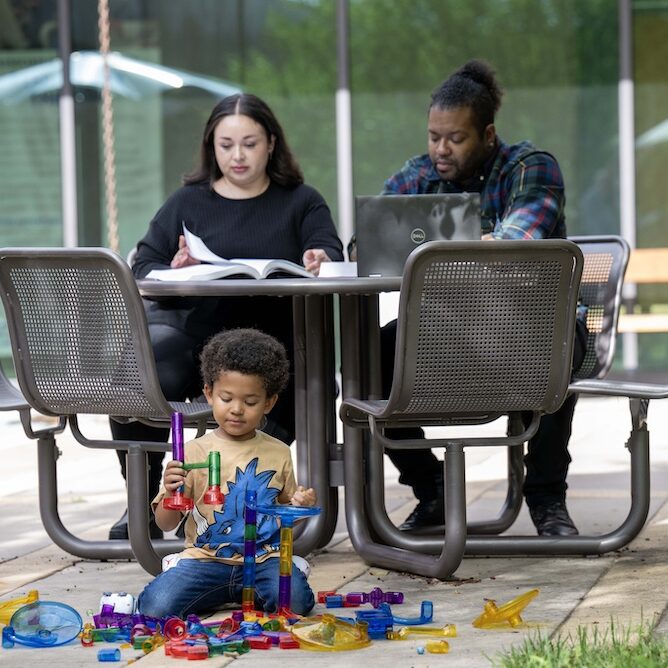STUDENT PARENT GUIDE
Succeeding in College
Find your stride with ongoing support designed to keep you moving forward, even when challenges arise.
STUDENT PARENT GUIDE
Succeeding in College
Find your stride with ongoing support designed to keep you moving forward, even when challenges arise.
Succeeding in College
Growing and Learning Together
Now that classes have started, there is still a lot to keep organized.
Every semester:
- Meet with your advisor to plan your courses for the following term and look ahead to see when you will finish your program
- Verify that the classes you are taking are in the College Course Catalog from the year that you started
- Check your financial aid and look for additional scholarships
- Update your child care backup plan and emergency plan
- Register for classes
- Meet with your faculty for office hours and set up a plan in case you miss class
- Update your planner/calendar with this term’s activities and family activities
WORKING Together
Faculty
The instructors teaching your classes care about you and your success, both in and out of the classroom!
- Attend office hours or set up a time to meet with your professors every term.
- When you meet with them, let them know a little about you as a student parent. While it can feel scary at times to disclose your parenting status, your instructors are better prepared to help you if they know more about you and what you are balancing.
- Reach out to your instructors when you don’t understand an assignment or topic through email or attend office hours. Here is an email template you can use to communicate.
- If you have to miss class or can’t complete an assignment on time, email or talk to your professors. Many are accommodating and will help you find a solution.
- Relationships with your instructors can lead to recommendation letters, support with employment, and help negotiating resources in the higher education system.
BUILDING Together
Networks and Peer Support
Going to school is about more than just the subjects you are studying. It is an opportunity to meet new people, participate in new experiences, and gain access to social networks that will help you along the way.
Find activities where you can bring your children, make strong connections with other students, and go out of your way to meet the staff and faculty. You never know who will be a great resource, mentor or friend! Even if you are fully online, find a way to create some type of community (like at SFCC we have the Student Parent Success Program) to feel more involved and like you belong. Because you do!
WORKING Together
College Resources
Student Resources and Support
All colleges offer student resources and support, but they vary depending on the college. You can ask your advisor about specific resources and search for “Student Services” on the college website. If you need something, ask! Many colleges are prepared to support students and their families with many needs outside of academics.
Some examples of student services are:
- Career and Employment Center
- Accessibility and Disability Services
- Veteran’s Center
- TRIO: Academic Support
- Tutoring Center
- Food Pantry
- Student Clubs
- Emergency Assistance Funding
- Wellness Centers and Counseling
- Computer Labs and Tech Support
- Libraries
- Campus Fitness Center
Go to your college’s student resource center to view other resources. See SFCC’s website for examples of resources available at colleges.
Student Story
“The college library has been an invaluable resource throughout my studies, providing access to a wide range of materials and tools that have greatly supported my academic success. The family-friendly spaces and STEM kits have been particularly helpful when I need to bring my child with me, allowing me to focus on my studies while keeping them engaged in educational activities. Additionally, the library’s online resources have been a lifesaver for me as an online student, offering convenient access to research databases, e-books, and other digital tools that make learning from a distance both effective and manageable.”
Accessibility Services
- Schedule a meeting with the Accessibility Services at your college to formalize class accommodations. Faculty are required to support all requested accommodations through the Accessibility Service Center.
- Greater accessibility can mean making physical modifications to a place or making resources more available, such as parking or learning tools. Most of all, greater access and support mean making sure you are fully included in every space and learning experience. Even if you aren’t sure what accommodations are possible, you can make an appointment with someone at accessibility services to better understand what accommodations would work best for you and your disability.
- Pregnancy-related support: All colleges have a Title IX officer who can provide you with support and accommodations for pregnancy-related needs for accommodations.
Wellness
Many colleges have wellness centers, fitness centers, and other ways to support student physical and mental health.
Being a parent can be exhausting on its own. Look for little ways to help yourself – five minutes of quiet time in your car before class, an extra glass of water in the morning. Self-care can also look like carving out some time to go for coffee with a classmate or taking a walk outside before class.
Taking care of your basic mental and physical health matters even more when you’re a student parent because you want to be your best self for your children and in the classroom. Children are great learners and keen observers, so they’ll notice when you model good self-care and know when to reach out for help.
Talk to a counselor – if you are struggling with your mental health, there may be a school counselor or mental health resource. This is a confidential process for you to receive mental health care. It is ok to receive care and help. Most colleges offer free counseling services. For example, SFCC uses UWILL and has an in-person counselor.
Student Tip
Many schools have counseling services and referral services for mental health support.
Learning Together
Staying Motivated
Getting a degree or certificate takes time and a lot of motivation to get to graduation. How can you and your kids stay motivated and excited about school?
Quality Time
With work and school, it may feel like you’re losing time with your kids. There are things you can do to help you balance the demands of being a working student parent.
- You can use your calendar to schedule family activities—not just assignments and your work schedule.
- Try scheduling a weekly family date when you and your kids have uninterrupted time together.
- Go to a museum on a free admission day, go to the pool, do a craft project together, or go to family reading at your city’s public library.
You can also set goals for your child’s learning and put those in your calendar. For example, if you have a goal to read with your child every night, put it in your calendar. Setting goals like this gives you great quality time with your kids and helps their learning and literacy.

Student Parents on Campus
More colleges are developing activities and programs designed for student parents. Participating in campus activities helps you connect with other student parents to share experiences and build your network, such as clubs or organizations for student parents.
If your college doesn’t already have a student parent club, start your own! Connect with the student activities or services center at your college to learn more about programs or groups that could be right for you.

Study Together
It may feel hard to get time with your kids while you’re studying. Good news—you can include your kids in your schoolwork, no matter their age.
- Read your schoolwork out loud to your kids. For children who are not in school yet, this helps their language learning and vocabulary.
- Do homework together, or they can do an activity like coloring while you study.
- Set up study spaces next to each other at home, the library, or a coffee shop.
- Go back and forth reading schoolwork out loud to each other.
For all ages, this teaches kids that education is a priority for everyone. Ask your children questions about their homework and how they feel about the topic. This directed, affectionate attention shows your children their problems are important to you. It helps you bond and get your work done at the same time.
Achieving Together
Navigating Your College Path
Preparing for College
Discover how to navigate going back to school with resources tailored for student parents like you.
Starting College
Get the guidance you need to balance family, work, and education, with tools that help you leverage campus resources and community support.
Succeeding in College
Find your stride with ongoing support designed to keep you moving forward, even when challenges arise.
Graduating College
Celebrate your achievements and plan for the future with resources that highlight next steps after graduation.
Achieving Together
Navigating Your College Path
Preparing for College
Discover how to navigate the big decision of going back to school with resources tailored for student parents like you.
Starting College
Get the guidance you need to balance family, work, and education, with tools that help you leverage campus resources and community support.
Succeeding in College
Find your stride with ongoing support designed to keep you moving forward, even when challenges arise.
Graduating College
Celebrate your achievements and plan for the future with resources that highlight next steps after graduation.
